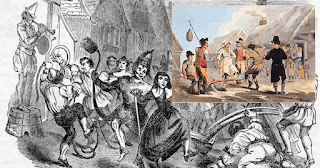In his Five Hundred Pointes of Good Husbandrie Thomas Tusser informs the reader that one festival still remains: Plough Monday. It was not a Christmas-Tide feast day but was celebrated, as the rule, on the first Monday after Twelfth Day.
The reason for the celebration was the return to the hard work of plowing. Presumably, it was made easier by starting with a day of dancing the plough and traditional games and good food and ale. Also presumably (given the details), the celebration had roots deep in Pagan times. Here follows a description of the day from Brand's Observation on Popular Antiquities.1
In the British Apollo (1710), to the inquiry why the first Monday after Twelfth Day is Plough Monday, answer is given ; “ Plough Monday is a country phrase, and only used by peasants, because they generally used to meet together at some neighbourhood over a cup of ale, and feast themselves, as well to wish themselves a plentiful Harvest from the great Corn sown (as they call Wheat and Rye) as also to wish a God-speed to the Plough as soon as they begin to break the ground to sow Barley and other Corn, which they at that time make a Holiday to themselves as a finishing stroke after Christmas, which is their Master’s holyday time, as Prentices in many places make it the same, appropriated by consent to revel amongst themselves.”
Pegge (Gentleman’s Magazine for December 1762) informs us that Plough-Monday, the Monday after Twelfth Day, is when the labour of the Plough and the other rustic toils begin. “ On this day the young men yoke themselves and draw a Plough about with Musick, and one or two persons, in antic dresses, like Jack-Puddings, go, from house to house, to gather money to drink. If you refuse them they plough up your dunghill. We call them here [in Derbyshire?] the Plough Bullocks.”
Macaulay says: “ On Plow-Monday I have taken notice of an annual display of MORRIS-DANCERS at Claybrook, who come from the neighbouring villages of Sapcote and Sharnford.”
In Tusser’s Five Hundred Points of Husbandry, under the Account of the Ploughman’s Feast-Days are the following lines —
"Plough Munday,"
Plough Munday, next after that Twelf-tide is past,
Bids out with the Plough, the worst Husband is last ;
If Plowman get hatchet, or whip to the skreene,2
Maids loseth their Cocke, if no water be seen
which are thus explained in Tusser Redivivus: “After Christmas which, formerly during the Twelve Days was a time of very little work), every Gentleman feasted the Farmers, and every Farmer their Servants and Task Men. Plough Monday puts them in mind of their business. In the morning the Men and Maid-servants strive who shall shew their diligence in rising earliest. If the Ploughman can get his Whip, his Plough-staff, Hatchet, or any thing that he wants in the Field, by the Fire-side, before the Maid hath got her Kettle on, then the Maid loseth her Shrove-tide Cock, and it wholly belongs to the Men. Thus did our Forefathers strive to allure youth to their duty, and provided them innocent mirth as well as labour. On this Plough Monday they have a good Supper and some strong Drink.”
The Monday after Twelfth Day, according to Coles, was anciently called Plough Monday, when our Northern ploughmen begged plough-money to drink. He adds: “In some places if the Ploughman (after that day’s work) come with his Whip to the Kitchen Hatch and cry “ Cock in Pot ” before the Maid cry “ Cock on the dunghill,” he gains a Cock for Shrove Tuesday. Coles tells us also of an old custom, in some places, of farmers giving sharping corn to their smiths at Christmas, for sharping plough irons, &c.
Tusser gives us a more detailed look at what will be done with the plow in January. Oats and barley will be sown. These will be harvested in March and the fields in which they were planted allowed to go to grass such that the soil may recover. The grass will be cut in May and dried to sell as hay beginning in June.
46. In Janiuere3 husband that poucheth the grotes
will break up his laie, or be sowing of otes,
Otes [sown] in Janiuere, laie4 by the wheat,
in May by the hay for the cattle to eat.
47. Let servant be readie, with mattock in hand,
to stub out the bushes that noieth5 the land:
And cumbersome rootes, so annoieng the plough,
turne upward their arses with sorrow [e]nough.
48. Who breaketh up timelie his fallow or lay,
sets forward his husbandrie many a way.
This trimlie well ended doth forwardly bring,
not onelie thy tillage, but all other thing.
49. Though lay land ye breke vp when Christmas is gon,
for sowing of barlie6 or otes therevpon,
Yet hast[e] not to fallow til March be begun,
least afterward wishing it had be[e]n [undone].
52. Land arable driven or worne to the proofe,
and craveth some rest for thy profits behoofe.7
With otes ye may sowe it, the sooner to grasse,
more soone to be pasture to bring it to passe.
1Brand, John. Observations on Popular Antiquities (1900).
2skreene] fireplace screen.
3Fiue Hundred Pointes of Good Husbandrie by Thomas Tusser. (1577, 1878). Payne & Herrtage, ed. "Such early sown Oats it is likely may be clearer of weeds;...”— Tusser Redivivus 1710
4laie, lay] untilled land, grass land, lea.
5 noieth] annoys; annoieng] annoying.
6 Ibid. "Barley is now very rarely, if at all, sown on lay land. The fallow he speaks of I take to be the second ploughing for Barley."— Tusser Redivivus 1710.
7 profits behoofe] profit's behalf. No apostrophe's were yet used in Tudor times to indicate possession.






No comments:
Post a Comment